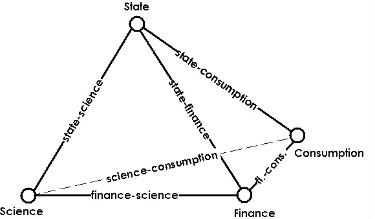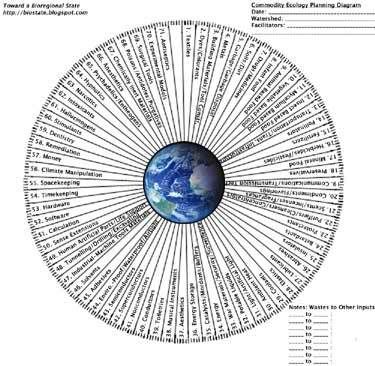Watershed Court Jurisdictions to Avoid Ecological Tyranny




Recent news on the BP "Oilpocalypse" reminded me of the sore requirements of another ecological check and balance mentioned in Toward a Bioregional State: court jurisdictions based on nested watersheds.
The principle of watershed jurisdiction was applied in watershed electoral districts discussed earlier here and here. What to do about the oceanic jurisdictions was discussed here.
Watershed jurisdictions are a way to avoid either placeless, corrupt elites gerrymandering election districts or, in this next case clear case of BP, we discuss two things: first, how the BP corporation attempts now to escape judgment from an oil-toxified 'environmental jury of its peers'; and in general, second, how all global corporations are 'legally' allowed to hold over us an ecological tyranny to escape local monitoring by foreign flag registering.
Current 'international law(lessness)' allows stable oil rigs/wells to be registered as 'moving ships'--thus allowing oil rigs to escape ecological self-interest of the local population that feels the externalities.
Global corporations, shippers, and oil rigs all take advantage of the same corrupt framework of false flag or flags of convenience registration. A placeless jurisdiction is an ecological tyranny for all peoples in any particular area.
The Deepwater Horizon drill platform, leased by BP, was owned by a Swiss corporation. It was registered as a 'ship' named the Deepwater Horizon in the Republic of the Marshall Islands. Where? This is a tiny, impoverished country in the Pacific Ocean incapable of international monitoring despite 'international law' saying it does. Surely the Marshall Islands failed to monitor or failed to have any local 'ecological self-interest' to monitor toxicity concerns in the Gulf of Mexico, so these international laws encourage an ecological tyranny as well.
These two ways highlight how the degradation of our world is institutional: badly ecologically adapted frameworks degrade our world and set up an ecological tyranny that defends itself from any improvement. Corruption is a formally degradative framework, an ecological tyranny. To maintain that ecological tyranny is why the Swiss company registered its Deepwater Horizon thousands of miles away from the Gulf of Mexico: because there was little chance of any policing of regulations against any ecological tyrannies it might be responsible for--and now it is--though the 'laws' that the degraders arrange keep them protected, keep them as tyrants over the whole planet.
The general point is that an ecological tyranny is a formal jurisdictional framework--and you are living within it. If you want something different, it requires formal institutional changes toward a bioregional state to remove these ecological tyrants and their bad material decisions and bad choices:
First, how is BP taking advantage of this ecological tyranny to keep itself from being punished?
And then, second, how does an ecological tyranny organize a Gulf of Mexico oil rig registration to a 'responsible country' thousands of miles away from the ecological self-interest of the people who experience environmental risk?
Any feedback from the people most damaged in an accident around the Gulf of Mexico--whether because of BP or the Swiss corporation--require removing the formal institutions of our ecological tyranny: integrating into our constitutional thinking more ecological principles of political and legal feedback on a daily basis.
Follow:
First, our case focuses on victimized Louisiana, though it is only one of five state jurisdictional venues of court suits been filed against BP. Many different jurisdictions against the Gulf suffer oil damage from BP--because of BP's actions and inactions both.
However, BP wants to shift all its court suits, judgments, and court jurisdictions to Texas. Most of the oil has hit Louisiana so far. Nothing has hit Texas directly so far.
In terms of watershed jurisdictions, the only environmental lawsuits that should be heard in Texas, are pollution events in three nested watershed catchment areas--#11m #12, and #13 "Watershed Federal Court Districts," lets call them. This is a map of nested watershed "HUC" (hydrological unit codes) for "the United States."
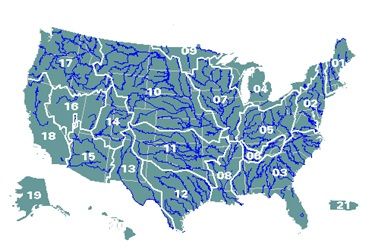
United States is in quotes because some of these larger "Watershed Federal Court Districts" are both U.S./Mexican issues. The ancillary issue, before we continue with BP's shenanigans, implies that the U.S.-Mexico border deserves a common court jurisdiction as well--where borderline-resident persons sharing a larger watershed experience in #13 split artificially by two countries, deserve to have court rights to sue in both Mexico and U.S. courts.
Returning to the BP story, "Louisiana" (inclusive of some areas upstream) would have its own watershed court jurisdiction, labeled #8. All the other Gulf states in teh U.S. affected to the east would be in a single "Watershed Federal Court District #3".
It's scientifically rational to do this with court jurisdictions when it comes to the environment. It's only humanly fair as well, since these are the areas that experience the externalities of the pollution, therefore they should be the judge of suitable compensation and/or punishment.
However, BP is potentially fleeing from its legal responsibilities and already filed court suits in polluted areas in the ongoing aftermath of the Deepwater Horizon oil disaster in the Gulf of Mexico.
BP is desperate to use its oily tendrils to escape the mess that it made. BP wants: to flee across the watershed border, to "choose its own prosecution," and to choose the jurisdiction under which it will be judged!
Can you think of any potential criminal, personal or organizational, graced with such a corruptible triptych of powers? There is little incentive for environmental recidivist individuals or organizations to improve and to avoid ecological damage in the future, if they are confident they can escape an environmental jury of their peers. Only with a watershed based court jurisdiction, is there a the real world incentive for them to improve bad environmental behavior.
More details on BP's legal moves in our 'ungreen state' of affairs:
July 26, 2010
BP wants Houston judge with oil ties to hear spill cases
MIAMI — Facing more than 100 lawsuits after its Gulf of Mexico oil spill killed 11 workers and threatened four coastal states, oil giant BP is asking the courts to place every pre-trial issue in the hands of a single federal judge in Houston.


"Time to Escape to Texas"
That judge, U.S. District Judge Lynn Hughes, has traveled the world giving lectures on ethics for the American Association of Petroleum Geologists, a professional association and research group that works with BP and other oil companies. The organization pays his travel expenses.
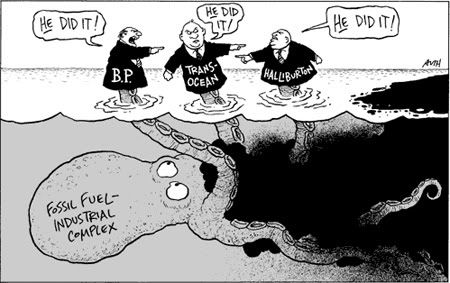
Hughes has also collected royalties from several energy companies, including ConocoPhillips and Devon Energy, from investments in mineral rights, his financial disclosure forms show. ...
Legal experts say the request for a single judge,...is unusual....
No one has suggested that Hughes — or any judge — would rule a certain way before hearing the evidence [despite it happening quite often enough to unseat 'high judges' before--data from the late Sherman Skolnick removed and jailed two members of the Supreme Court of Illinois on a similar case of judges corrupted by financial connections in 1969]....
The company [BP] wants all of the oil spill lawsuits — at least 98 as of May 21 — to be heard in Houston....BP is facing suits in at least seven different courts in five states, including Florida.
BP requested the judge in papers filed with the U.S. Judicial Panel on Multidistrict Litigation, as part of a larger request to have all pre-trial matters decided in one court....The special panel of judges will decide in July if the BP suits should be consolidated in a single court — and if Hughes should handle the cases.
Shrewd lawyers often try to steer cases to judges viewed as potentially sympathetic to their arguments, said Elizabeth Chamblee Burch, an assistant professor of law at Florida State University.
"Sometimes they will ask for a judge by name," Burch said. "Other times, they are a bit wilier about what they'll ask for, so it looks less blatant."
Other lawyers were surprised that BP was seeking to select its own judge; in both state and federal courts, cases are typically assigned to judges randomly.
"I'm utterly horrified," said David Guest, an environmental lawyer with Earthjustice with decades of experience handling complex pollution cases. "That's not to impugn the integrity of the judge, but something is fundamentally wrong when you're doing a thing like that."
Lawyers for BP referred questions to a spokesman, who did not return calls Wednesday....

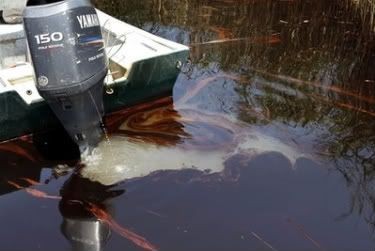
Plaintiffs' attorneys have filed their own request to have the BP cases heard in New Orleans.
BP could potentially face hundreds of millions of dollars in claims stemming from what U.S. officials are now calling the worst oil spill in American history. In addition to suits from those injured in the April 20 explosion on the Deepwater Horizon, the company faces a litany of claims from commercial fishermen and others who say the oil spill fouling the Gulf has harmed their businesses.
BP has already paid $29 million to settle more than 12,000 claims, the company said in court papers.
If the outstanding claims against BP are set before Hughes, he will have considerable sway over how those cases are handled, deciding which lawyers will lead the case for the class of plaintiffs, and how the law should be applied. If the cases go to trial, they will be transferred back to their original courts.
For the past two years, Hughes has served as a "distinguished lecturer on ethics" for the American Association of Professional Geologists, a Tulsa-based organization representing 35,000 geologists around the world, most of whom work in the oil and gas industry. During that time, the judge has given 13 speeches for the organization, from Texas to Cape Town, South Africa.
Just days before the rig explosion that triggered the spill off Louisiana's coast, Hughes spoke on a panel at an AAPG convention in New Orleans.
The AAPG pays for Hughes' travel costs from the organization's $32 million charitable foundation, said Larry Nation, an AAPG spokesman. BP does not contribute to the fund that pays for Hughes' travel, though the company has made other donations to the AAPG foundation, Nation said. The judge receives no fees for his speeches.
The AAPG is primarily a scientific organization [and we know how commercially motivated to lie scientific workers can be, for a price], not a trade group, Nation said,....
Geologists who attend the judge's lectures can also earn educational credits that count toward their state licenses, Nation said. Hughes' tenure as AAPG's lecturer on ethics is scheduled to end in July....
Hughes also has dabbled in the oil business himself, leasing the mineral rights on 11 parcels to different oil and gas exploration firms — none of them BP — according to his financial disclosure form filed last year. The report indicates Hughes received between $7,500 and $26,000 in royalties from those leases in 2008.
As a judge, Hughes has handled many cases involving BP and other oil companies — including disputes among oil companies — as have other federal jurists in Houston, a petroleum industry hub.
In one controversial 2002 case, Hughes ruled in favor of oil companies seeking to avoid the $100 million cost of moving their pipelines for a dredging project in the Port of Houston. An appeals court later reversed the judge and said the industry, not the government, was responsible for the cost.
In 2007, Hughes ordered three European oil companies to pay $26 million in fines for paying off Nigerian officials for an offshore drilling expedition — the largest fines ever levied for violating U.S. foreign bribery laws.
Hughes is now overseeing a suit brought by two former auditors with the federal Minerals Management Service, who have accused Royal Dutch Shell of under-reporting almost $4 million in royalties owed to the U.S. government. The case is pending.
Hughes has also managed multi-district litigation in the past, and he oversaw a special docket of asbestos-related lawsuits [how interesting...] in the 1990s."
The comments on that news article on how BP wants to tyrannically choose its own judge has a lot of people upset with BP's "nerve" and "gall." However, this will continue to happen without structural change.
U.S. Constitutional Framer James Madison wrote, paraphrasing and updating: 'we require government (ecological) checks and balances on corruption because men are not (environmental) angels.'
To handle the scale of organized environmental degradation caused by corruption, we require additional ecological checks and balances in many different areas. The bioregional state offers at least 60 additional ecological checks and balances.
One of these are court jurisdictions. Bioregional state court jurisdictions are based on nested watersheds, instead of built from non-environmental frameworks as in most states worldwide. If pollution happens in a certain jurisdiction, it is only right to have the trial in that polluted jurisdiction, or in a jurisdiction that is affected by that pollution.
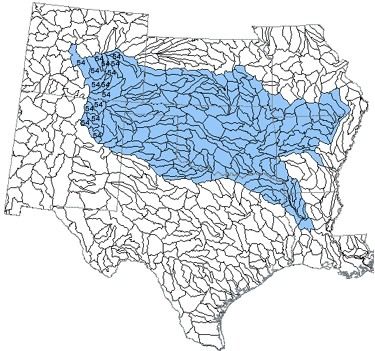
It is unfair to have that court case transferred out of the affected area, particularly in a case where the petroleum regime has a federal judge associated with it.
The bioregional state's solution to judicial jurisdictions:
Section 17.Picture these judicial frameworks sliding in:
The Congress shall have Power...To constitute Tribunals inferior to the Supreme Court, though only based on single watershed jurisdictions or on Congressionally decided watershed aggregates derived from multiple boundaries of contiguous watersheds based only on the principle of tangible high levels of nestedness within Hydrologic Unit Codes.
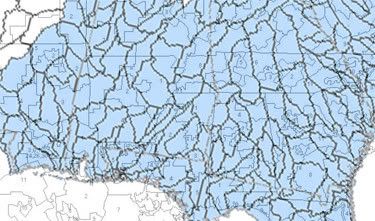
The second example of an ecological tyranny of 'false flag oil rig and ship registration' has clear formal institutional frameworks that protect the degraders and punish the victims. Seven solutions for oceanic jurisdictions were discussed earlier, here.
June 14, 2010
Foreign flagging of offshore rigs skirts U.S. safety rules
"The Marshall Islands, not the U.S., had the main responsibility for safety inspections on the Deepwater Horizon.
Reporting from Washington — The Deepwater Horizon oil rig that exploded in the Gulf of Mexico was built in South Korea.
It was operated by a Swiss company [Transocean] under contract to a British oil firm.
Primary responsibility for safety and other inspections rested not with the U.S. government but with the Republic of the Marshall Islands — a tiny, impoverished nation in the Pacific Ocean.
And the Marshall Islands, a maze of tiny atolls, many smaller than the ill-fated oil rig, outsourced many of its responsibilities to private companies.
Now, as the government tries to figure out what went wrong in the worst environmental catastrophe in U.S. history, this international patchwork of divided authority and sometimes conflicting priorities is emerging as a crucial underlying factor in the explosion of the rig.
Under International law, offshore oil rigs like the Deepwater Horizon are treated as ships, and companies are allowed to "register" them in unlikely places such as the Marshall Islands, Panama and Liberia — reducing the U.S. government's role in inspecting and enforcing safety and other standards.
"Today, these oil rigs can operate under different, very minimal standards of inspection established by international maritime treaties," said Rep. James L. Oberstar (D-Minn.), chairman of the House Transportation Committee.
Some offshore drilling experts, as well as some survivors of the explosion that led to the massive spill, say foreign registration also permitted a confusing command structure and understaffing — factors that may have contributed to the disaster.
Senior members of Congress — including Oberstar and House Natural Resources Committee Chairman Nick J. Rahall II (D-W.Va.) — have begun looking into the inspection and staffing issues.
The House Subcommittee on Coast Guard and Maritime Transportation will hold a hearing Thursday on foreign-flagged rigs in the Gulf of Mexico [and how it contributes to an ecological tyranny].
Different types of rigs are classified differently, and the Marshall Islands assigned the Deepwater Horizon to a category that permitted lower staffing levels.
"Over the years, the manning dwindled down and down," said Douglas Harold Brown, chief mechanic aboard the Deepwater Horizon, who had been assigned to the floating drilling rig since shortly after it was manufactured in 2000. "I believe that safety was compromised by this," he said in an interview."
Brown's lawyer and others say the Marshall Islands licensed the Deepwater Horizon in a way that allowed rig operator Transocean Ltd. to place an oil drilling expert — the so-called offshore installation manager — ahead of a licensed sea captain in making decisions on the day of the explosion.
The dual command structure created confusion that delayed an effective response to the growing crisis aboard the Deepwater Horizon, he and others allege.
...
A deepwater oil rig floats above the well, connected by thousands of feet of pipe, and is kept in position by thrusters and elaborate navigational systems.
Since World War II, thousands of ships and rigs from the U.S. and other industrialized countries have been registered in less-developed nations like the Marshall Islands.
Some members of Congress are expressing concern about the Marshall Islands and other countries that outsource their inspection responsibilities to private companies. Coast Guard officials confirm that more rigorous inspection procedures apply to the relatively small number of rigs registered in the U.S.
A foreign vessel will be reviewed by the Coast Guard, but the inspection is relatively cursory, relying on inspection reports prepared by outside firms that have been paid directly by the owners of the vessel.
The federal Minerals Management Service, which also has a role in overseeing offshore oil operations, deals only with issues "below the waterline" of the floating rig. It was not responsible for rig staffing, command structure or other above-water operations.
John Konrad, a licensed captain who publishes a maritime blog and is consulting with survivors, said oil rigs should be under the command of licensed sea captains.
"On the Deepwater Horizon you had the guy who does the drilling plans able to make the call on safety," Konrad said.
Such dual command structures would not be accepted for U.S.-flagged operations, experts say.
The Deepwater Horizon captain testified to investigators last month that he conferred with the drilling manager before he attempted to disconnect the rig. By the time a crew member decided on his own to push the emergency disconnect, it was too late.
Kennedy, the spokesman for Transocean, said, "Having two complementary positions that reflect the dual functionality of the rig, as the Horizon did, provides a clear but collaborative chain of command that has been employed by the industry for decades."
But Steven Gordon, a maritime lawyer in Houston representing Brown, six other survivors and the family of one of the 11 workers killed in the blast, said, "This course of action cost men their lives."
"It led to a jumble of disorganization on the Deepwater Horizon at the moment when organization was needed the most," he said.
Conclusion
The common localist moral of these two stories of placeless environmental tyranny is that instead of only 'the polluter pays,' the polluted jurisdiction is the area that has 'paid' (as a victim first) and thus deserves first jurisdiction, naturally.
From the first story highlighting the ecological tyranny taken advantage of by BP, instead, any preexisting county judges would have a novel watershed based jurisdiction on environmental lawsuits extending around them, and sometimes some parts of their square-drawn county would be under another judge from that point on. It's the only ecologically rational option for court proceedings, unless you want more environmental degradation and systemic corruption.
There was another corrupt outcome to a switch of jurisdiction that removed the lawsuit against Dick Cheney that he was ineligible to stand for Vice President in 2000 because he and the Presidential Candidate came from the same State, which is illegal in the U.S. The judge venue was transferred out of the location where it was residing first, into Texas where Bush and Cheney were claiming to be residents simultaneously, and the Texas venue of jurisdiction found, to make a long story short, that the U.S. law failed to apply to the U.S. political elites who can be effectively overlord criminals without the checks and balances of the bioregional state.
For the second story, instead, watershed jurisdictional principles could be done on the oceans by removing many forms of corrupt formal institutions that encourage environmental degradation on the high seas:
This could be done via:
1. An oceanic coast guard: only for policing environmental issues, fisheries technology usage, and pelagic preserves on the high seas.
2. #1 implies a removal of all flags of convenience. Thus, there should be one global shipping registry; the removal of all near criminal "flags of convenience" would be beneficial because the former encourages organized crime, drug running, and shell corporation protections from any crimes they commit in another countries waters. Plus, flags of convenience are a form of environmental risk as well, as made clear by the Jule 2003 article in The Ecologist on how with their lack of policing or investigatory power, shippers (and oil corporations) have basically let their ship/rig tonnage stay in service until it rots without required maintenance or monitoring. Particularly on liquid carriers, energy carriers, or on oil rigs, leaving false flags for oil rig tyrants is a formal institutional recipe for their ecological tyranny that creates oil slicks and long term ocean damage.
Perversely, the whole "flags of convenience" framework has gotten so corrupt that even complete landlocked states like Bolivia claim to have the power to "register and police international ships"! Sure. I'm sure the international shippers or oil rig corporations using Bolivian or Marshall Island registrations quake at the thought of these impoverished countries coming after them.
In short, as a solution, all international shipping should be registered with only one body, and policed separately by this oceanic coast guard. This removal of all flags of convenience and their "race to the bottom" of ever lowering standards of registration and policing of registration would be highly beneficial to cleaning up the oceans from the point of view of the shipping and oil rig trades. Particularly, oil rigs should be removed from the 'mobile ship' category as a example of high corruption that has encouraged environmental degradation.
To keep oil rigs in this category--without local territorial state policing jurisdictions--has created a context for flags of convenience expanding systemic risk in the shipping fleet tonnage or oil rig tonnage in the oceans, and it encourages organized crime and environmental tyrants at the same moment.
The registers know that the states of registration are in many cases unable to police their licenses. It's a huge joke, and the victim is the environment at large and through that it punishes the health of us all.
These novel "skull and bones" pirate flags of convenience have been flown quite a while in other words--deceptively being the flags of a handful of tiny statelets across the world used as flags of convenience for hiding the really big fish shippers of countries that use them, when tyrants want some form of removal of legal liability for what would hardly be tolerated in their home countries, on land.
A side issue would allow for subsidiary nation state policing to aid the oceanic coast guard in that nation's waters. Only with this allowance, for a working agreement for a 'gray area' of jurisdictional overlap in this near-coastal oceanic jurisdiction area, will it work. This allows a double check and balance: if the land-based state regulation is corrupt, people can always appeal to the international coast guard. On the other hand, if the international coast guard is corrupt, people can appeal to the land jurisdiction. The point is to give the local groups impacted as many venues as possible to avoid the gatekeeping of an ecological tyranny over them.
I would recommend that any country found corrupt in these frameworks should be banned (at least for a number of years) from all future shipping/registration related jobs in their own waters, as more, for a period, is passed to the international venue. When it is better, it is passed back to the local or international venue of registration simultaneously.
2. complete removal of frameworks of subsidies of the age-old (and outdated) maritime state (discussed here) that have only caused the self-destruction of the oceans through subsidies for increasingly supply-side biased large scale high technological fishing. The maritime state is subsidizing ocean fisheries into a dead abyss.
3. perhaps running something like a Grameen bank for funding the sustainable boat building designs for smaller sustainable social relations of fishing or energy production offshore for Third World areas (and First World areas). Along the lines of Michael Bradley's design styles mentioned offhandedly in his book Dawn Voyage, or along the many ideas in the energy category of Commodity Ecology.
4. To make #1 clear, and to elaborate, this implies policing international marine reserves and the high seas against illegal technological fisheries use on the waves; serious reduction of seine, drift micro-filament netting and industrial fishing; longlines, trawlers, and drift nets as described above should be banned as technologies of fishing because they are closer to technologies of clear cutting or and strip mining; if that fails to politically fly work on it slowly first with perhaps only licensing all such technologies, with later capacities of revoking or arresting those on the high seas for illegal fishing behavior, and then, slowly shrinking all the licensing of these down to zero, combined with aid to reequip those thrown out with different technological bases of fishery. Punishment is hardly the issue. The issue is successfully making the transition from unsustainable fishing practices to more sustainable (and efficient) technologies employed in them as well as help recover the fishery base that provides even more jobs.
5. Countries could fund the oceanic coast guard through a small percentage of their catch or offshore profits in general, for a start. Then it could be self-funding: as the catch gets better with the sustainable security, the budget is rewarded as well; fish hauls get administered physically in such a way that the oceanic coast guard or the territorial state's equivalent (perhaps a dual team to prevent corruption in one or the other) measures it and will get its .5% percentage cut of the catch profits for maintaining its fleet, crews, and perhaps its "Grameen style" shipping bank for aiding technological conversion (though the latter could be done by others, feasibly).
6. Only to reiterate, the weight and measurement frameworks of all internationally registered shipping will be set by uniform standards, instead of multiple different (and unpoliced standards) under flags of convenience that has led to a "race to the bottom" on safety standards, environmental standards, and fishing standards. These standards make #5 possible to generate as well.
7. Perhaps, for the consumer, the oceanic coast guard could have a branch that was based on validating that shippers or fishers can advertise successful sustainable practices, with a label, thus giving such practices consumer financial support (and getting the producers interested in aiding the consumer with more information). It will be as well a mass political support by providing the consumer with more information about sustainable fishing practices of their operations over other unsustainable operations. This could be a series of different oceanic-to-consumer logos for different issues (like "sustainably caught, verified", the type of netting used ("caught without a longline/drift net" logo; "non trawler" caught logo; or "bycatch reduction bait used"; "this energy unit supplied in this way, etc."), etc. This is already being done in part by some non-profit certification organizations.
These were just seven interlocking ideas for how to apply our ecological self-interest in good environmental outcomes to bioregional motifs on the sea. Before that I gave several ways to put interlocking jurisdictions into place on the watershed level on land.
Remembering that most of the planet is ocean, and as the unsustainability crisis is already on our collective doorstep, something like this should be done as soon as possible.
If you enjoy the way things are, continue to watch well-organized environmental degradation sponsored, protected, and subsidized by your government. And paid for by your children in money and in their health.
If you are interested in change, check out Toward a Bioregional State.

The point is without structural change, this will keep happening and ecological tyrants will keep ruling badly and making environmental degradation. Demand a Constitutional amendment putting environmental based court suits in watershed jurisdiction, and demand the removal of 'flags of convenience', false flag ecoterrorism from corporations.
We live within a non-ecological formal structure that encourages eco-criminals to reward themselves to damage our health, ecology, and economics.
A bioregional state would provide the ecological checks and balances on degradative tyrannical power.











